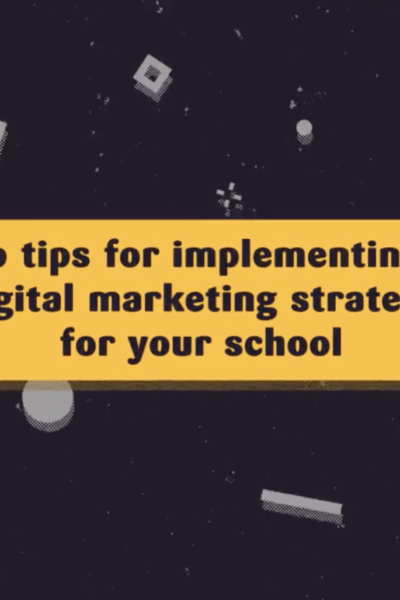As an independent school in the UK, you’ll be no stranger to the challenges facing the independent sector right now. With mis-conceptions to overcome, it can be an uphill struggle for schools to showcase their impact and influence.
That is where a digital marketing strategy comes in. Whether you are recruiting new teaching staff, showcasing the contribution the school makes to the local community or attracting new students, our top tips for implementing a digital marketing strategy in your school will help…
Understand your audience
The first step when embarking on a digital marketing strategy is to define your target audience. This will help to determine your messaging and the best channels to use.
You need to have a clear vision of who you are speaking to and what will catch their interest. For example, if you are hoping to attract new students to your independent school, you’ll need to reach the parents of these young people.
Consider channels such as Facebook, where you will most likely find staff and parents who want to know more information about the school. On Twitter and Instagram, you will find a younger audience, usually made up of current pupils or former pupils who have recently left the school. Do your research from the outset so you can angle your content so that it works for the audience on that channel.
Utilise your website
A fully-optimised and functional website allows you to share the best of what your school has to offer by using pictures, videos, blogs, testimonials and more. By optimising your website you’ll ensure your content connects with the right audience.
Using Search Engine Optimization (SEO) tools such as keyword research and analytics, you can determine what your content should be, who it should be aimed towards and what it is they are looking to find out, maybe even before they know themselves.
Optimising a website is an investment, but it is worth its weight in gold. It will drive more traffic and allow you to track what is bringing your target audience to your site which is valuable information when planning future content.
Conduct keyword research
You will be able to conduct keyword research using the Google keyword planner, which is free to use. This will provide the basis for your content. Keyword research delves into what it is that people are searching for and picks out key words, phrases and terms that you should include in your copy to ensure traffic is driven to your website.
Simply go to the keyword planner in Google Ads via your Google account and type in up to 3 key terms related to your school or what you want to write about. The planner will find all the key search terms to download that have relevance to your school.
Depending on the terms used there is likely to be a lot of results, but don’t let that overwhelm you – keyword research is such a useful task and is well worth the time it takes. Ideally you are looking for terms with a high search volume and low competition to ensure your content is seen.
Create content
Now that your keyword research has supplied you with a list of key terms, you can begin to plan and create your content based around these.
Our recommendation is that you create a plan using these key terms to ensure that as many of them as possible are being used and the time spent doing your keyword research was not wasted. If possible, get a group together to brainstorm content which could include case studies of pupils, ex-pupils, parents or teachers, videos of the school or blogs on relevant topics.
All content you post should have a purpose. Your keyword research means you know that the content you create is made for the right audience and will ensure they are the ones who see it.
Share on social media
Social media is one of the most powerful digital marketing tools. It will allow you to find your audience and speak to them directly, sharing the content you create so that your audience can find out more about you.
Allow an open space for them to be able to contact you and ask questions. Let their questions to prompt discussions and give ideas of more content. There’s a lot of competition, so make sure you utilise social media as best as you can to ensure that your school doesn’t get lost in the crowd.
Measure, optimise and report
Using Google Analytics you will be able to monitor how well your website and its content are performing. This great tool provides information about how many people your content has reached, how long each of them stayed on the page, where the traffic came from and much more. Tracking this monthly will allow you to see what isn’t performing as well and implement changes to get a better reach.
If your social media platforms are set up as business accounts, you will have access to the analytics of the pages. This will allow you to find out which posts are performing well and which aren’t, as well as how many people engaged with the material. This will help you to tailor your next lot of social content around when is best to post and what people are likely to engage with.
Other free tools like Moz will allow you to track your key search terms and find out how well they are performing compared to other websites.
Regardless of the challenges you want to tackle, there are many ways a digital marketing strategy can help your school. As time may be tight, it may not be feasible for you to do all of this yourself. A digital marketing agency can help you develop your strategy, create your content and test the activity and results against your marketing objectives.
Want to discuss how a digital marketing agency can help your school? Don’t hesitate to get in touch.


